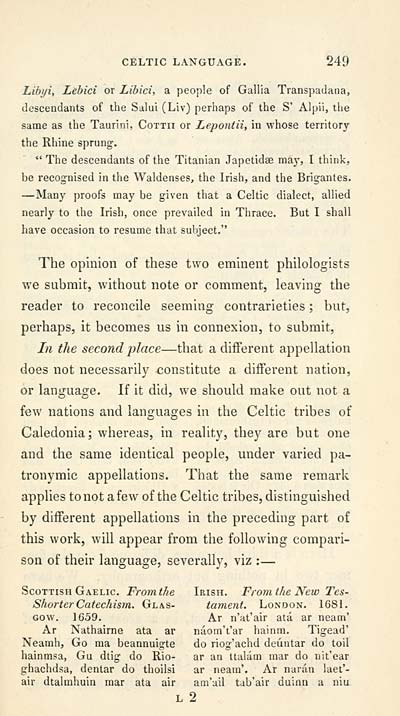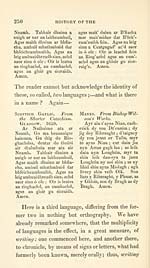Download files
Complete book:
Individual page:
Thumbnail gallery: Grid view | List view

CELTIC LANGUAGE. 249
Libyi, Lebici or Libici, a people of Gallia Transpadana,
descendants of the Salui (Liv) perhaps of the S' Alpii, the
same as the Taurini, Cottii or Lepontii, in whose territory
the Rhine sprung.
" The descendants of the Titanian Japetidee may, I think,
be recognised in the Waldenses, the Irish, and the Brigantes.
— Many proofs may be given that a Celtic dialect, allied
nearly to the Irish, once prevailed in Thrace. But I shall
have occasion to resume that subject."
The opinion of these two eminent philologists
we submit, without note or comment, leaving the
reader to reconcile seeming contrarieties ; but,
perhaps, it becomes us in connexion, to submit.
In the second place — that a different appellation
does not necessarily constitute a different nation,
or language. If it did, we should make out not a
few nations and languages in the Celtic tribes of
Caledonia; whereas, in reality, they are but one
and the same identical people, under varied pa-
tronymic appellations. That the same remark
applies to not a few of the Celtic tribes, distinguished
by different appellations in the preceding part of
this work, will appear from the following compari-
son of their language, severally, viz : —
Scottish Gaelic. J/-o?w</^e Irish. From the New Tes-
Shorter Catechism. Glas- lament. London. 1681.
Gow. 1659. Ar n'at'air aid ar neam'
Ar Nathairne ata ar naom't'ar hainm. Tigead'
Neamh, Go ma beannuigte do riog'achd deuntar do toil
hainmsa, Gu dtig do Rio- ar an ttulam mar do nit'ear
ghachdsa, dentar do thoilsi ar neam'. Ar naran laet'-
air dtalmhuin mar ata air ani'ail tab'air duinn a niu
L 2
Libyi, Lebici or Libici, a people of Gallia Transpadana,
descendants of the Salui (Liv) perhaps of the S' Alpii, the
same as the Taurini, Cottii or Lepontii, in whose territory
the Rhine sprung.
" The descendants of the Titanian Japetidee may, I think,
be recognised in the Waldenses, the Irish, and the Brigantes.
— Many proofs may be given that a Celtic dialect, allied
nearly to the Irish, once prevailed in Thrace. But I shall
have occasion to resume that subject."
The opinion of these two eminent philologists
we submit, without note or comment, leaving the
reader to reconcile seeming contrarieties ; but,
perhaps, it becomes us in connexion, to submit.
In the second place — that a different appellation
does not necessarily constitute a different nation,
or language. If it did, we should make out not a
few nations and languages in the Celtic tribes of
Caledonia; whereas, in reality, they are but one
and the same identical people, under varied pa-
tronymic appellations. That the same remark
applies to not a few of the Celtic tribes, distinguished
by different appellations in the preceding part of
this work, will appear from the following compari-
son of their language, severally, viz : —
Scottish Gaelic. J/-o?w</^e Irish. From the New Tes-
Shorter Catechism. Glas- lament. London. 1681.
Gow. 1659. Ar n'at'air aid ar neam'
Ar Nathairne ata ar naom't'ar hainm. Tigead'
Neamh, Go ma beannuigte do riog'achd deuntar do toil
hainmsa, Gu dtig do Rio- ar an ttulam mar do nit'ear
ghachdsa, dentar do thoilsi ar neam'. Ar naran laet'-
air dtalmhuin mar ata air ani'ail tab'air duinn a niu
L 2
Set display mode to: Large image | Transcription
Images and transcriptions on this page, including medium image downloads, may be used under the Creative Commons Attribution 4.0 International Licence unless otherwise stated. ![]()
| Early Gaelic Book Collections > Blair Collection > History of the Celtic language > (255) |
|---|
| Permanent URL | https://digital.nls.uk/76181414 |
|---|
| Description | A selection of books from a collection of more than 500 titles, mostly on religious and literary topics. Also includes some material dealing with other Celtic languages and societies. Collection created towards the end of the 19th century by Lady Evelyn Stewart Murray. |
|---|
| Description | Selected items from five 'Special and Named Printed Collections'. Includes books in Gaelic and other Celtic languages, works about the Gaels, their languages, literature, culture and history. |
|---|

